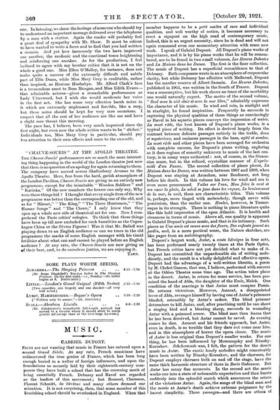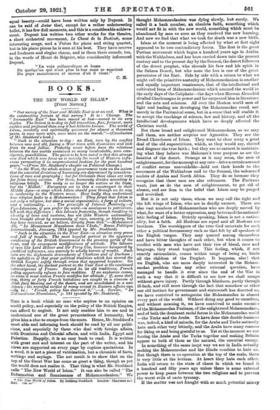MUSIC a
GABRIEL DUPONT.
SIGNS are not wanting that music in France has entered upon a second Grand Sack. At any rate, French musicians have rediscovered the true genius of France, which has been long enough buried in a welter of foreign influences, and upon the foundations so securely laid by their eighteenth-century com- posers they have built a school that has the crowning merit of being essentially French. Debussy and Ravel are regarded as the leaders of this movement ; but Roussel, Chausson, Florent Schmitt, de Severac and many others demand our attention. It is not surprising, then, that some member of this Bomishing school should be overlooked in England. When that member happens to be a petit maitre of rare and individual qualities, and well worthy of notice, it becomes necessary to erect a signpost on the high road of contemporary music. Indeed, this is an urgent necessity, since he is dead and will not again command even our momentary attention with some new work. I speak of Gabriel Dupont. All Dupont's piano works of importance, and it is by his piano works that he will be remem. bered, are to be found in two small volumes, Les Heures Dolentes and La liaison dans les Dunes. The first is the finer collection. The music of Dupont has a superficial resemblance to that of Debussy. Both composers wrote in an atmosphere of crepuscular clarity, but while Debussy has affinities with Mallarme, Dupont has the manlier reserve of Albert Samain. Les Heures Dolentes, published in 1905, was written in the South of France. Dupont was a consumptive, but his work shows no trace of the morbidity one would naturally expect•. The motto of the second volume, " Seul avec is ciel Glair et avec in mer litre," admirably expresses the character of his music. In wind and rain, in sunlight and in starlight, he found inspiration. Frequently he succeeds in capturing the physical qualities of these things as convincingly as Ravel in his aquatio pieces conveys the impression of water. La snort rode, the best known of Dupont's piano works, is a typical piece of writing. Its effect is derived largely from the contrast between delicate passages entirely in the treble, doux et mysterieux, and ominous passages in the bass, agile et sombre. La mort rode and other pieces have been arranged for orchestra with complete success, for Dupont's piano writing, exploring as it does regions of sonority unknown to music of the last cen- tury, is in many ways orchestral : not, of course, in the Straus- sian sense, but in the refined, crystalline manner of L'apres- midi d'un Fame. The second collection of piano pieces, La Maison dans les Dunes, was written between 1907 and 1909, when Dupont was staying at Arcachon, near Bordeaux, not long before his death. In this volume his love for wind and sea is even more pronounced. Voiles sur 'eau, Mon frare is vent et ma sceur in pluie, Le &Ail as joue dans les tagues, Le bruissement de la mer, in nuit, these are characteristic titles. This volume is, perhaps, more tinged with melancholy, though never with pessimism, than the earlier one. Houles, however, is Turner. esque in its strength. There is nothing in piano literature quite like this bold impression of the open Atlantic. It is health and cleanness in terms of music. Above all, one quality is apparent in Gabriel Dupont's piano music, and that is its intimacy. Such pieces as Une amie est venue avec des fleurs, Des enfants jouent au jardin, and, in a more poetical sense, the Nature sketches, are like pages from an autobiography.
Dupont's largest work, Antar, a conte herolque in four acts, has been performed nearly twenty times at the Paris Opera, but French critics have not yet decided what to make of it. Dupont has committed the unpardonable sin of writing melo- diously, and the result is a wholly delightful and effective opera. Dupont had the advantage of a well-written libretto, a poem by M. Chekri Ganem, that was, I believe, performed with success at the Odeon Theatre some time ago. The action takes place in the desert. Antar, in return for some service, has been pro- mised the hand of Abla, the daughter of the Emir, Malek. Ono condition of the marriage is that Antar must conquer Persia. Ho returns victorious. However, Amarat, a disappointed lover of Abla, revenges himself by having one of Antar's prisoners blinded, ostensibly by Antar's orders. The blind prisoner determines to kill Antar, and, after practising until he can shoot a singing bird and a bleating sheep, succeeds in wounding Antar with a poisoned arrow. The blind man then learns that he has been deceived, but Antar cannot be saved. As evening comes he dies. Amarat and his friends approach, but Antar, even in death, is so terrible that they dare not come near him, and in this atmosphere of horror the opera closes. The music of Antar is less original than Dupont's smaller works. For one thing, he has been influenced by Moussorgsky and Rimsky- Korsakov. Scheherazad,e was, I felt, the pattern for the desert music in Antar. The exotic lonely melodies might conceivably have been written by Rimsky-Korsakov, and the choruses, for Dupont employs choruses both on and off the stage, have the same thick harmonic structure of those in Boris Godounov. But Antar has many fine momenta. In the second act the music works one into a state of unbearable expectation and then bursts suddenly into the splendid march which announces the return of the victorious Antar. Again, the songs of the blind man and the music at Antar's death achieve extreme poignance by the barest simplicity. These passages—and there are others of
can be said of Antar that, except for a rather uninteresting equal beauty—could have been written only by Dupont. It ballet, it has few dull moments, and this is a considerable achieve- ment. Dupont has written two other works for the theatre, a short orchestral movement, Le Chant de is Destines, some interesting songs, and a Polme for piano and string quartet, but in his piano pieces he is seen at his best. They have reserve and freshness and elegiac charm, and in them there sounds, too, in the words of Henri de Regnier, who considerably influenced Dupont, " La voix molancolique et basso
C. H.







































 Previous page
Previous page